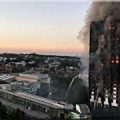But housing minister says further funding must come from the building owners. (Hasn’t that been tried before?)

By Harry Scoffin
The Guardian reports that leaseholders across 12 sites in Manchester are preparing to take the government to court over their policy towards fire safety problems with privately-owned tower blocks.
Although government has recently pledged £200m to make private residential buildings safe, it only applies to high-rise properties with Grenfell-style ACM cladding.
Announced last month, the policy was prompted by the refusal of a number of freehold landlords to take action. They had rejected government exhortations not to recoup the costs of the remedial works from leasehold tenants.
It is estimated that there are at least 1,000 buildings across the country that have combustible material which is of a non-ACM variety.
Manchester-based leaseholders whose homes do not fall under the scheme are understood to be pursuing legal action on the basis of a state failure to ensure “adequate housing” as defined in international law. Their counsel is also exploring the option of suing over poor building regulations.
Residents face bills of up to £80,000.
Manchester tower block residents to sue in fire safety row
Exclusive: residents say it is unfair there is money to fix cladding but not other issues
Fran Reddington, the leaseholder who in March successfully pressured original developer Lendlease to cover the costs of remedial works and a “waking watch” at Manchester’s Cypress Place development, now helps locally to campaign to protect lessees from paying for safety works to buildings they do not legally own and which do not currently qualify for financial assistance from government.
Speaking to the Guardian, she spoke of a “cladding lottery” that has emerged:
“We feel cast aside in terms of the cladding lottery they have created… Government isn’t stepping up to help. Some residents are facing £80,000 bills and we don’t have any other choice. Fire doesn’t distinguish between the different types of dangerous material but the government is doing just that.”
James Oates, a 31-year old leaseholder living in Manchester’s Skyline Central 1 building, which has wooden cladding, is also quoted:
“If building control signed off a building like this, it is not doing its job properly. It all stems back to the government. It seems strange they can announce a fund for ACM [cladding] but not other [problems]. It feels unjust. We are being told by Greater Manchester fire and rescue that if we don’t have a waking watch in place they would have to evacuate the building.”
Meanwhile, housing minister Kit Malthouse has told Inside Housing that government has no plans to provide further funding for works to private blocks with fire safety issues:
“It’s not envisaged that there is at the moment, no. As we’ve said, building owners are responsible for the safety of their buildings.
“ACM [aluminium composite material, which was used to clad Grenfell Tower] is an exceptional situation where we’ve had to act quickly and frankly. With ACM, quite a lot of private sector owners and developers are fronting the bills anyway.
“But in those circumstances [balconies], we’re not currently envisioning any funding, no.”
After the Barking fire earlier this month, where a wooden balcony burst into flames and quickly engulfed the building, MHCLG issued a directive to freeholders to remove all combustibles from balconies “as soon as is practical”. Crucially, it included buildings below 18 meters in height.
Under law, these costs will fall on the leaseholders. This is despite the leaseholders not owning the property or the land on which it sits.
The government line that building owners have a “moral responsibility” to pay for safety works has been challenged by LKP in the past. It is either state failure because of deficient building regulations or the fault of developers.
In January, it was revealed that a senior Tchenguiz group executive wrote to leaseholders at Northpoint, a former office block in Bromley, south east London with a number of safety issues including ACM cladding, to highlight the inconsistencies of government’s approach. The correspondence read:
“I firmly believe that the recent announcement by government that they would force freeholders to pay for remediation is a hollow threat and it knows it…
“… it is highly unlikely that they [national and local government] will be able to achieve secure repayment from us because of the legal position.”
Despite repeated interventions by their local MP Bob Neill, leaseholders at Northpoint are still facing crippling costs.
They have been denied government money because they have building fire safety problems additional to the Grenfell-style ACM cladding, which is thought to complicate their situation and increase costs for government.
No funding for removal of combustible balconies, says Malthouse
Kit Malthouse, housing secretary Picture: Guzelian No funding for removal of combustible balconies, says Malthouse #ukhousing #CIHhousing In an interview with Inside Housing, he revealed that despite the Ministry of Housing, Communities and Local Government (MHCLG) issuing guidance on Monday asking building owners to remove combustible materials, it would not contribute money towards the work.
In a speech yesterday to delegates at the Chartered Institute of Housing’s Manchester conference, Mr Malthouse suggested that his department was flushed with money. Inside Housing reports he said he was “one of the few ministers who’s not complaining about money”.
“I’ve got about £45bn to spend on the housing market in its entirety,” he added.
Leaseholders of the 272 private apartments at Northpoint say they will become bankrupt without government intervention.
They still face a personal bill of £75,000, with many working shifts as fire marshals to reduce the financial strain.





 Now it is Shanly Homes dumping its customers into unsellable homes
Now it is Shanly Homes dumping its customers into unsellable homes






















I am pleased to hear this, though naturally sorry that innocent leaseholders have been left with no other option.
That there have been several very well documented occurrences of fire where the cladding has accelerated the spread of fire, that the Scottish Government banned the use of this type of cladding, whilst the Environmental Committee debated cladding safety back in 2000, should I hope enhance the leaseholder’s case?